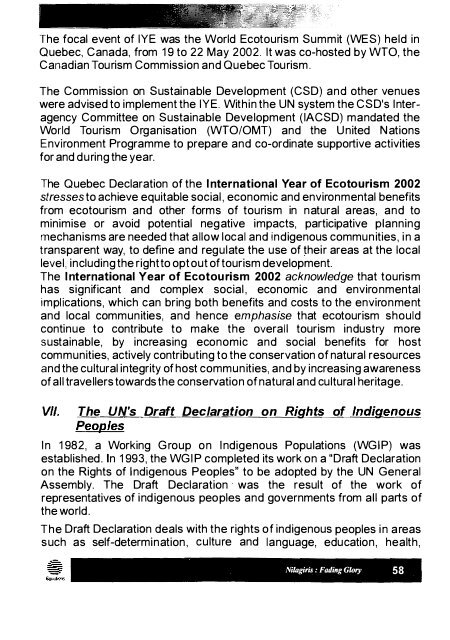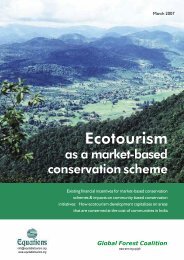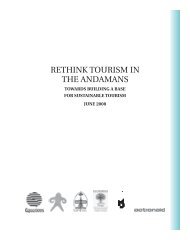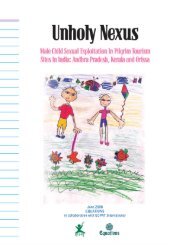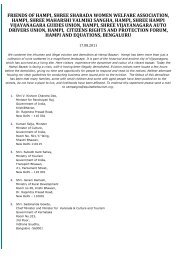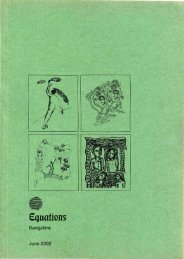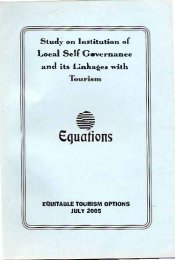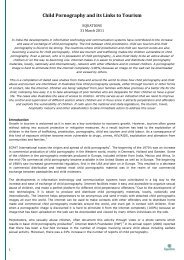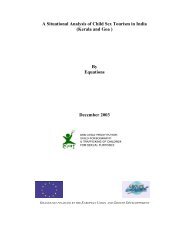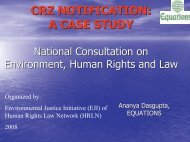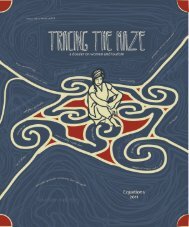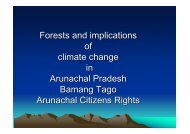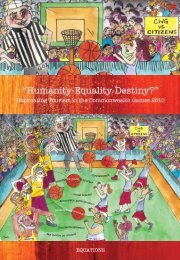Nilgiris Biosphere Reserve - Equitable Tourism Options
Nilgiris Biosphere Reserve - Equitable Tourism Options
Nilgiris Biosphere Reserve - Equitable Tourism Options
Create successful ePaper yourself
Turn your PDF publications into a flip-book with our unique Google optimized e-Paper software.
The focal event of lYE was the World Ecotourism Summit (WES) held in<br />
Quebec, Canada, from 19 to 22 May 2002. It was co-hosted by WTO, the<br />
Canadian <strong>Tourism</strong> Commission and Quebec <strong>Tourism</strong>.<br />
The Commission on Sustainable Development (CSD) and other venues<br />
were advised to implement the lYE. Within the UN system the CSD's Interagency<br />
Committee on Sustainable Development (IACSD) mandated the<br />
World <strong>Tourism</strong> Organisation (WTOIOMT) and the United Nations<br />
Environment Programme to prepare and co-ordinate supportive activities<br />
for and during the year.<br />
The Quebec Declaration of the International Year of Ecotourism 2002<br />
stresses to achieve equitable social, economic and environmental benefits<br />
from ecotourism and other forms of tourism in natural areas, and to<br />
minimise or avoid potential negative impacts, participative planning<br />
mechanisms are needed that allow local and indigenous communities, in a<br />
transparent way, to define and regulate the use of their areas at the local<br />
level, including the right to opt out of tourism development.<br />
The International Year of Ecotourism 2002 acknowledge that tourism<br />
has significant and complex social, economic and environmental<br />
implications, which can bring both benefits and costs to the environment<br />
and local communities, and hence emphasise that ecotourism should<br />
continue to contribute to make the overall tourism industry more<br />
sustainable, by increasing economic and social benefits for host<br />
communities, actively contributing to the conservation of natural resources<br />
and the cultural integrity of host communities, and by increasing awareness<br />
of all travellers towards the conservation of natural and cultural heritage.<br />
VII.<br />
The UN's Draft Declaration on Rights of Indigenous<br />
Peoples<br />
In 1982, a Working Group on Indigenous Populations (WGIP) was<br />
established. In 1993, the WGIP completed its work on a "Draft Declaration<br />
on the Rights of Indigenous Peoples" to be adopted by the UN General<br />
Assembly. The Draft Declaration was the result of the work of<br />
representatives of indigenous peoples and governments from all parts of<br />
the world.<br />
The Draft Declaration deals with the rights of indigenous peoples in areas<br />
such as self-determination, culture and language, education, health,<br />
Nilagiris : FtUlillg Glory 58


